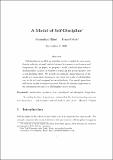Files in this item
A model of self-discipline
Item metadata
| dc.contributor.author | Mihm, Maximilian | |
| dc.contributor.author | Ozbek, Kemal | |
| dc.date.accessioned | 2017-05-24T14:30:09Z | |
| dc.date.available | 2017-05-24T14:30:09Z | |
| dc.date.issued | 2016 | |
| dc.identifier | 240871419 | |
| dc.identifier | d88a451f-bb40-4123-94b1-7764ff9e7f25 | |
| dc.identifier.citation | Mihm , M & Ozbek , K 2016 ' A model of self-discipline ' . | en |
| dc.identifier.uri | https://hdl.handle.net/10023/10844 | |
| dc.description.abstract | In this paper, we propose a model of self-discipline where a decision-maker balances the benefits of regulating her moods against a cost of self-discipline effort. Self-discipline is beneficial as it reduces the chances of internal conflict, yet it is a costly effort to undertake. We provide an axiomatic characterization of our model in a menu-choice framework, and show how costs of self-discipline can be elicited and compared across individuals. Our model generalizes well-known models of temptation-driven behavior by viewing temptations as the endogenous outcome of a self-discipline choice problem. | |
| dc.format.extent | 48 | |
| dc.format.extent | 689782 | |
| dc.language.iso | eng | |
| dc.subject | Menu-choice | en |
| dc.subject | Preference for commitment | en |
| dc.subject | Self-discipline | en |
| dc.subject | Temptation | en |
| dc.subject | HB Economic Theory | en |
| dc.subject | HM Sociology | en |
| dc.subject.lcc | HB | en |
| dc.subject.lcc | HM | en |
| dc.title | A model of self-discipline | en |
| dc.type | Working or discussion paper | en |
| dc.contributor.institution | University of St Andrews. School of Economics and Finance | en |
This item appears in the following Collection(s)
Items in the St Andrews Research Repository are protected by copyright, with all rights reserved, unless otherwise indicated.

